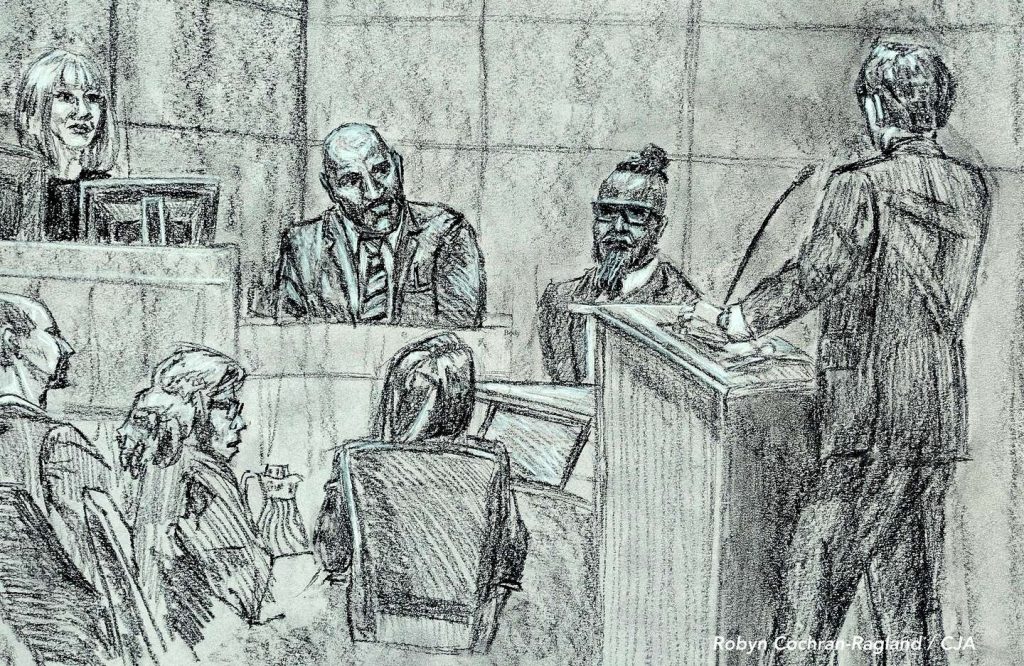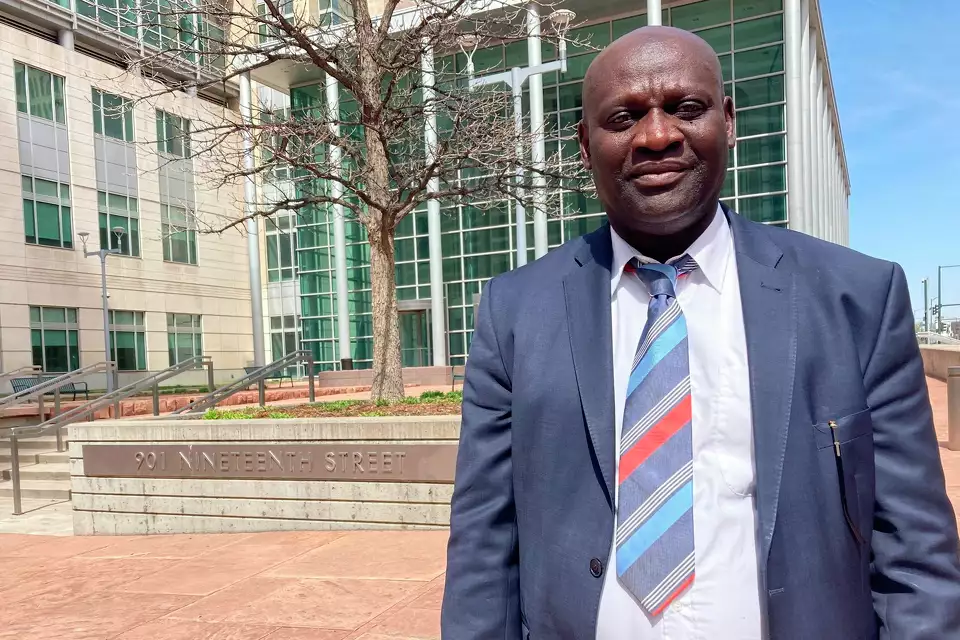Gambiaj.com – (DENVER, Colorado) – The trial of Michael Sang Correa, a former Gambian military officer and ex-member of Yahya Jammeh’s hit squad, the “Junglers,” continued on Thursday. Correa faces six counts related to the torture of five people in an attempt to coerce confessions of involvement in a 2006 coup attempt against The Gambia’s then-president Yahya Jammeh.
Suspected of backing a coup plot against the longtime dictator of The Gambia nearly 20 years ago, Tamsir Jasseh is one of five men Correa is charged with torturing in 2006.
Tamsir Jasseh, “Correa participated overzealously in the beatings.”
Tamsir Jasseh told the jury he left The Gambia in 1986 to join the U.S. Navy and obtain a degree in criminal justice at Georgia State University in Atlanta. After serving in the U.S. military for a decade, Jasseh obtained U.S. citizenship in 1996. He returned to The Gambia in 1999 carrying sample SWAT uniforms from the Atlanta Police Department and the hope of bringing reform to his native law enforcement.
Instead of being given to police officers, the uniforms would eventually be worn by the dictatorial president’s private military unit, the Junglers, also known as the Black Blacks.
“Dissenting speech was not tolerated, and people were very distrusting,” Jasseh said, explaining life under authoritarian Jammeh to the jury.
Jasseh said he wasn’t involved in the plotting of the 2006 coup but drove the movement’s architect, Colonel Ndure Cham, to the Senegal border to escape. Jasseh said the risk of facing the criminal charge of aiding and abetting was worth saving Cham’s life.
Soon after, however, Junglers dressed in black-black uniforms detained Jasseh and brought him to the National Intelligence Agency for interrogation.
First, Jasseh was ordered to confess his role in the coup under the threat of being beaten. In the days after Jasseh signed the coerced confession and apologized on camera, he was taken to a courtyard and beaten with whip-like branches cut fresh from a banana tree. On one occasion, Correa placed a black plastic bag over Jasseh’s head, preventing him from breathing until he bit a hole through the material.
While some Junglers held back, Jasseh said Correa “participated overzealously” in the beatings.
Jasseh said Correa tormented him for obtaining U.S. citizenship and that Jammeh asked to hear his screams over the phone to ensure he wasn’t being let off easy.

Jasseh was sentenced to 20 years of hard labor after being convicted of treason by the Gambian court. At the urging of American activist Reverend Jesse Jackson, however, Jammeh released Jasseh in 2012, allowing him to return to the U.S. Jasseh returned to The Gambia only after Jammeh lost reelection and fled into exile in 2017.
Paring Sanyang, “Sand Particles of the NIA Courtyard Lodged in my Eye“
Another victim Pharing Sanyang, a former military officer in Gambia, also took the stand Thursday in federal court in Denver against Michael Sang Correa. Sanyang served as a second lieutenant in the Gambian Armed Forces and, as a member of the Commander unit that protected the statehouse.
Sanyang showed the jury the scars he carries from being beaten in 2006, including cigarette burns and bayonet slashes on his left arm. Pharing Sanyang described how he was beaten with pipes and palm tree branches, pistol-whipped, and hit in the face with a hammer. Particles from the sandy ground of the NIA courtyard where the military officer fell during one of the 2006 beatings lodged in his eyes, causing damage requiring several surgeries, he testified.
“The panel told me, ‘You must confess, or we’ll deal with you,” Sanyang recalled. Though he told the jury he played no role in the coup, he said he confessed anyway because “I had to save my body.”
Sanyang told jurors he eventually agreed to sign a false confession but wiped blood from his head onto the paper to show he had been tortured. Then, after refusing to confess on television, he was shocked with wires plugged into a wall socket and beaten again, he said.
Bleeding, he read his confession for the television camera, but only the audio was recorded to conceal the torture, he told the court.
“I had to save my body,” Sanyang said of why he agreed to confess, adding he did not join the failed insurrection against Jammeh, who ousted the previous president of Gambia in a coup of his own in 1994.
Sanyang spent nearly a decade in prison after being convicted of treason and fled to nearby Senegal after his release.
Ebou Jarjue, “I Did Not Try to Poison Jammeh“
American prosecutors additionally called Ebou Jarjue to the stand, a Gambian man who served as a waiter at the statehouse and personally taste-tested Jammeh’s food to make sure it wasn’t poisoned.
After he was arrested on suspicion of trying to poison Jammeh, a crime Jargue says he did not commit, Jargue eventually fled to Senegal, where he remained until Jammeh fell from power.
Demba Dem, “They Hung Me Upside Down“
Earlier, Demba Dem testified on Wednesday that his torturers put a black plastic shopping bag over his head and beat him as he was handcuffed.
Another time, they put a heavy bag of sand on his back and then held a piece of hot metal close to his nose. Then they hung him upside down, his wrists and ankles tied, beating him again.
The former teacher who became a member of the Gambian parliament as part of Jammeh’s political party said Correa used a stick to beat him.
Dem, who said he was not part of the planned coup, later moved to the Netherlands with his family after seeking asylum and was diagnosed with post-traumatic stress disorder. He was reluctant to talk on the witness stand about the impact the torture had on his life, other than saying it was “very bad” and asking a prosecutor to move on.
Still, Dem said he was “happy” to be in court to try to hold one of his abusers accountable.
“I have to do it, but I feel satisfied,” he said.
Correa’s Lawyers, “Our Client Was Acting Under Orders”
Correa’s lawyers have not disputed that the defendant was involved in Sanyang’s torture even though Sanyang said Correa, like the other Junglers, was wearing a face mask. Sanyang said he knew Correa from working with him at the president’s official home and recognized his “walking gait.”
They said he was acting under orders and that if he did not carry out the beatings, he would have been subjected to the same or worse treatment.
If Correa is found guilty, each count carries a maximum sentence of 20 years in prison, a $250,000 fine, and restitution, adding up to a potential sentence of 240 years.
George W. Bush-appointed Senior U.S. Judge Christine Arguello is presiding over the trial at the Alfred Arraj U.S. Courthouse in downtown Denver. The trial continues into next week.










